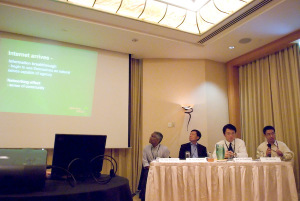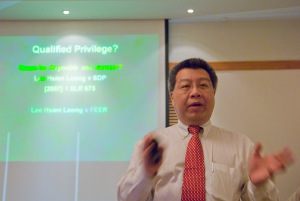by
JUSTIN ZHUANG AND LIN JUNJIE
June 27th, 2007

While the Internet has opened up unprecedented opportunities for dissent, Singaporeans have not exploited it, said panelists at a media conference yesterday.
“Singaporeans just do not seem to know what to do with it, nor do they seem to care to use this instrument for political ends,” said Arun Mahizhnan and Tan Tarn How from the Institute of Policy Studies. They speculated that this could be a result of a young generation that views democracy in terms of prosperity, stability, security and responsibility rather than “freedoms, rights and political choice”.
Tan added that Singaporeans may not actually feel repressed as Singapore is “a very free society” where people can freely engage in almost anything – besides political activity.
The IPS researchers were part of a panel addressing freedom of digital speech at the 16th annual conference of the Asian Media Information and Communication Centre being held this week.
Fellow panelist Alex Au, a gay rights activist, pointed out that the government’s “light touch†regulation on the Internet had given “unprecedented leeway†to dissent online, but that this has had little impact on Singaporean’s electoral behaviour.
“But no one should be under the illusion that that is all there is to it. The government does carry a big stick behind its back,” Arun added.
The state attempts to “control what is actually controllable” by “narrow[ing] the retaliatory action to those that seriously challenge a principle, or a value that the society cherishes … rather than attack all and sundry offenders.” He cited racial harmony, protection of minors and public decency as examples.
Law professor Tey Tsun Hang from the National University of Singapore agreed that regulation of online media was not as heavy as print media controls, which he described as “sophisticated, calibrated and effectiveâ€.
Arun said this difference in regulation was creating “a sense of schizophreniaâ€. For instance, while the Singaporean blogger Mr Brown, also known as Lee Kin Mun, was allowed to criticise the government online, he was chided when he wrote a similar column in a mainstream media publication Today.
When quizzed by a member of the audience about the future of media regulation in Singapore, all four speakers agreed that it was unlikely that regulation of online media will tighten. However, any evolution will be slow.
“The fairways are getting wider… the OB markers will be reduced in numbers but in certain cases the intensity of the OB markers will remain,†said Arun.
 In a separate forum on media law, constitutional law expert Kevin Tan touched on how previous court rulings in Singapore suggested that the “newspaper ruleâ€, which protects journalists from revealing their sources, is not a “sacred cow of journalism that cannot be slaughtered†in Singapore.
In a separate forum on media law, constitutional law expert Kevin Tan touched on how previous court rulings in Singapore suggested that the “newspaper ruleâ€, which protects journalists from revealing their sources, is not a “sacred cow of journalism that cannot be slaughtered†in Singapore.
As for the Sedition Act, he pointed out that while similar laws in many other parts of the world had become disused or even been repealed, it was recently used against two Singaporean bloggers who made racist remarks online and was even being “strengthened and renewedâ€.
– journalism.sg photo by Lin Junjie.
Listen to full audio recording
Tan Tarn How and Arun Mahizhnan
Freedom of Speech in the Digital World — Drawing Boundaries in a Borderless World
Electric Fences and Land Minds: Behind Singapore’s Regulatory Regime
Virtual Insurgencies: Gay Speech on Singapore’s Internet
Recent Developments in Singapore Media Law & Practice

Be the first to comment on "Few takers for online dissent, say experts"